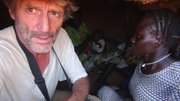Kauda, Sudan,
Testimony from Sudan: The bomb-filled everyday life of the villagers of Kauda in the Nuba Mountains
Tomo Kriznar

Tomo Križnar
Kauda, 21st January 2015
Tuesday at about 13:30 pm
Roaring in the sky. Fleeing into »fox holes«. The great expectation.
But the sky goes quiet again.
Relief. Getting out of the holes. We all quietly go back to where we were before, feeling a bit ashamed. Like so many times before in the last two days and nights, I go back to my hut. Back to my two backpacks, my suitcase with the cameras, batteries and solar cells, back to my quadrocopter.
I was reading the instruction manual when it came back - the distinctive hollow booming sound that makes your blood flow faster so that running, jumping and leaping into caves doesn’t seem hard at all.
This time the bell tolls – the bell being a piece of a bomb that hangs from a tree. And then the characteristic swishing sound. The earth seems to tense up as if bracing itself for the blow. Everything goes quiet for a moment – the birds, the wind in the treetops, even the breathing of all of us, crammed together in a cave. We tense up as well. The only sound that is heard is the digital buzzing of my camera. I’m pressing it against my cheek and turning it to the faces of the children, mothers and girls, pressed against the floor.
I think of my wife Bojana and the kids. Another thought: if it has to come down on us – and now it’s bound to, there’s no other way, it’s too late and we can’t turn back time – please, don’t let it hit us directly. Let it fall somewhere else...
And then the blast.
A loud boom.
Very close.
Once. Twice. Three times. Four times.
One of the mothers smiles. The three children don't. Nobody's crying, not even the youngest one, pressed to his mother's bosom. The locals are already used to this. It's all becoming a routine.
In reality it's all so stupid and boring.
We wait for the shrapnel to stop flying around. One of the girls gets up and looks out. There’s a cloud of dust and smoke over the market place in Kauda, less than a kilometre away.
But there’s no time to go there. The bomber is coming back. I take refuge in another hole in the ground to film these people, all crammed up, forgotten, abused, sacrificed, bargained into insignificance. Now, while they’re still alive. Now, while it’s perhaps still possible to do something. They politely step aside and make room for me. All men here. And then the standard procedure begins. Business as usual! Swishing sounds, mortal fear, last thought, another thought.
And thunder and booming and echoing over the granite mountains.
I feel delight for a fraction of a second. Gratitude for still being alive. I vow never to chew tobacco again, never to show my anger again. I’ll be like a butterfly, like a sweet-smelling rose...
But no, I’m already angry again. Angry with the ones in the bombers, angry with the ones in Khartoum, angry with everyone without balls... Angry with the ones who don’t know how to love, who only think of money. The ones in Qatar, Saudi Arabia, Russia, China, America and Europe... Disgusting freaks who only care about their spoils and profit, and want to banish our brothers and sisters, our common predecessors, from the cradle of humankind.
The Russian Antonov is coming back. The same thing has happened so many times since we crossed the border between the two Sudans three days ago and reached these cheerful, courageous people in the Nuba mountains in South Kordofan, Sudan. Every time you ask them how they’re doing, they say, “Moral fog! Moral is high!’”
This time we count to thirteen. The whole small settlement of Kauda is wrapped in smoke. We stand there and watch and exchange glances. I know what they’re thinking. You with the cameras, you’ve been convincing us all these years that the footage will get your people to help, the ones who are still sensitive enough and haven’t been roboticized yet. The Christians, humanists, humanitarians...
A man on a motorcycle drives by. I yell and he stops. I jump on behind him and run away with him, away from the yard of the indigenous people’s Organization for self-help. We drive along a run-down path that was washed out during the last rainy season. We cross a dried-up sandy riverbed. The river has withdrawn underground which is what I would like to do myself. And then upwards to the empty market place that was abandoned in a hurry and where everything has remained as it was before, modest and scarce. We pass some villagers with dust-covered faces and go to the western side, where flames are visible through the huts.
Two people were wounded and have already been taken to the hospital in Gidel. Two men, one younger and one older. There’s a dead pig and a chicken, shredded to pieces.
Bomb craters. A white powder. Pieces of metal. The stench of poisonous chemicals. Chopped up trees.
Holes in the walls of the huts. Burning straw and wood.
People are gathering. There are a lot of children, barefooted, half naked children in rags. The women are dressed as birds. Men wear worn-out Arabic jalabiyas. Some wear European trousers and shirts.
And there’s my friend, Ibrahim Mustafa, who helped me in January 2011, four months before the military once again attacked the Nuba. He saved me from the agents from Khartoum so they wouldn’t take me away, lock me up and convict me like they did in 2006 in Darfur when I was charged with being a spy and a liar.
“Where’s the international community?” he asks into the camera. “There’s no international community!”
“Yes! You’re right! There are only assholes!”
